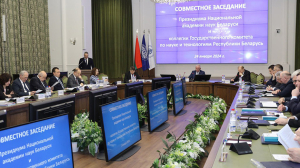Ru
|
Eng
Belarusian scientists told to focus on designing unmanned transport, recycling Li-ion batteries
24.01.2024

MINSK, 24 January (BelTA) – A joint session of the Presidium of the National Academy of Sciences of Belarus and the collegium of the State Committee on Science and Technology took place at premises of the National Academy of Sciences of Belarus (NASB). The session was chaired by Deputy Prime Minister of Belarus Piotr Parkhomchik, BelTA has learned.
Participants of the session reviewed results of scientific, R&D, and innovative activities in 2021-2023, goals and tasks Belarus’ scientific community is supposed to accomplish in 2024-2025 and in the consequent five years. Participants of the joint session discussed a draft of the comprehensive forecast of Belarus’ scientific and technical progress in 2026-2030 and in the period till 2045 as well as proposals on priority avenues of scientific, R&D, and innovative activities in 2026-2030.
During the joint session Piotr Parkhomchik put forward proposals on improving the sphere of science, introducing breakthrough scientific products of Belarusian scientists at enterprises of the real sector of the economy. He also spoke about long-term goals and tasks.
The deputy prime minister mentioned the need to step up efforts to design unmanned transport, including efforts to ensure these vehicles are fit for Belarusian public roads. Piotr Parkhomchik gave instructions to expedite the work on creating a most important element in Belarus – an accumulator for electric vehicles of Belarusian make. Apart from that, he underlined the importance of working out a technology for recycling lithium-ion batteries, in particular, those that have been imported to Belarus. It is necessary to get in touch with Russia in order to work out a joint resolution, including within the framework of programs of the Union State of Belarus and Russia. Industry-specific government agencies were instructed to consider the matter of setting up new manufacturing facilities and of possibly resuming the work of enterprises that had been operating previously in regions of the country.
Piotr Parkhomchik was also made familiar in detail with projects of young scientists of NASB organizations. The projects were represented during a qualification phase of the republican youth innovation project 100 Ideas for Belarus.
SCIENCE. TECHNOLOGY. INNOVATIONS
13.08.2024
28.06.2024
28.06.2024
25.06.2024
05.06.2024
15.05.2024
15.05.2024
26.04.2024
26.04.2024
26.04.2024













